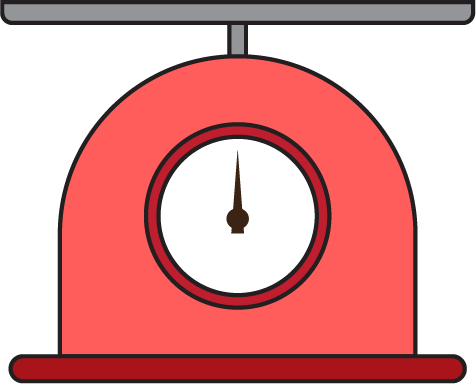Menu
At week nine, you are now in your third month of pregnancy. This means you are now in the last month of your first trimester. At this stage, you now have six more months of pregnancy left. By week nine, you have 31 weeks left to meet your little one, although you might not get up to the 42nd week of pregnancy. The birth of a mature baby occurs from the 37th week of pregnancy.
It might be too early to feel kicks, but it’s not too early to hear something at your doctor’s appointment this week. Your baby’s heartbeat might be detectable on Doppler equipment.
At your baby’s rump, the embryonic tail at the bottom of the spinal cord has almost vanished! He’s starting to look more like a miniature human.
Tiny muscles are beginning to form this week, but you won’t be able to feel those small punches for at least another month or two.
It might be too early to feel kicks, but it’s not too early to hear something at your doctor’s appointment this week. Your baby’s heartbeat might be detectable on Doppler equipment.
At your baby’s rump, the embryonic tail at the bottom of the spinal cord has almost vanished! He’s starting to look more like a miniature human.
Tiny muscles are beginning to form this week, but you won’t be able to feel those small punches for at least another month or two.
Your baby will have a broad face at this time. The eyes are widely set apart. The eyelids are completely formed by now, and thus the eyes are closed. The ears have taken the definitive shape by now and are set below the eyes at week nine.
By week nine, all major organs and systems have formed. Your baby is beginning to look more and more like a normal human baby. However, at this time, your baby’s head will still make up half of your baby’s body.
The upper limb and lower limb have developed almost completely. They now look like normal human hands and legs. However, the thighs and legs are still very short compared to the arms and hands. The fingers are fully divided by now and are thus no longer webbed.
The external genitalia has begun developing by this stage but looks similar and you still cannot detect if you are having a baby boy or girl.
The intestine is still located in the umbilical cord at week nine. The liver, which has now completely developed, will begin to produce red blood cells. The liver is the main organ that produces red blood cells for your baby at week nine.
Your baby may begin to form urine at week nine. And will frequently urinate into the amniotic fluid, although urine production picks up between weeks 13 and 16. This action also causes the amniotic fluid to increase in volume. Your baby also begins to make swallowing movements at this stage, they will frequently swallow some amniotic fluid as the week passes by and their body will absorb some of the swallowed amniotic fluid.
Your baby has become much more than it was at the beginning of the pregnancy. Bone formation is actively taking place at week nine, but the bones are still very soft. Your baby, at this stage, is making lots of movements, but you will not notice these movements yet.
The heart is still very active. It pumps blood and maintains the exchange of gas between your baby and the placenta. Oxygen, carbon dioxide, and waste products now produced by your baby will be removed via the placenta.
At week nine, your baby is approximately 0.9 inches. This roughly equals the size of a green olive. However, your baby is now measured in crown-rump length at this stage of pregnancy. Your baby will have a crown-rump length of 0.9 inches. The crown-rump length is the length used by health experts to measure the gestational age of your baby; it is the distance between the head and buttocks of your baby.






At 9 weeks pregnant, you have about 31 more weeks to complete your pregnancy journey.
At nine weeks pregnant, you may feel like you’ve already reached your limit in pregnancy symptoms, but you’re still visiting the bathroom several times a day; if it’s not to pee, then it’s because you are sick. Your clothes are growing tighter around your waist, and you’re busting out on top.
Extreme weariness during pregnancy is a typical symptom, particularly in the first trimester and there’s a solid explanation for this: Conceiving a baby is a hard job. As the placenta develops, your body works overtime preparing for motherhood. Always ask for assistance, and don’t overwork yourself. Also, make sleep and rest a priority. Finally, to keep your energy levels steady throughout the day, focus on nutrient-fortified foods rather than unhealthy foods.
Yes. For some women, You may notice a baby bump at week nine. This baby bump is still very small, and can only be noticed when you put on tight-fitting clothes.
The mood swings experienced are similar to that of premenstrual syndrome. The flooding of the pregnancy hormones estrogen and progesterone in you body causes mood swings. In addition, your mood will change often with the constant fluctuations in the blood levels.
Heartburn this week is due to the hormones progesterone and relaxin. They both weaken the muscular gateway between your stomach and your oesophagus. This gateway is called the sphincter. Weakness of the sphincter will allow acid contents from the stomach to move up to the oesophagus causing heartburn.
Because your body is actively preparing for childbirth and breastfeeding, your breasts will begin to enlarge. This enlargement of your breasts will cause the skin around your breasts to stretch and thus become itchy.
Constant feeling of tiredness and dizziness is due to the changes occurring in your body. These changes will require that your organs get more blood. By doing this, your heart begins to work harder. As a result, it begins to pump more blood faster. This will cause you to become more tired and dizzy. So you might feel the urge to sleep more often.
Frequent urination and Constipation
Even though your baby has grown significantly at week nine, your uterus begins to enter your abdomen. Since your uterus is still in the pelvis, It presses against the bladder and the rectum. This causes you to urinate frequently and to be easily constipated.
Nutrients you get are shared between you and your baby. In an attempt to replenish nutrients, your body requires you to be constantly hungry.
The mood swings experienced are similar to that of premenstrual syndrome. The flooding of the pregnancy hormones estrogen and progesterone in your body causes mood swings. In addition, your mood will change often with the constant fluctuations in the blood levels.
Heartburn this week is due to the hormones progesterone and relaxin. They both weaken the muscular gateway between your stomach and your oesophagus. This gateway is called the sphincter. Weakness of the sphincter will allow acid contents from the stomach to move up to the oesophagus causing heartburn.
Because your body is actively preparing for childbirth and breastfeeding, your breasts will begin to enlarge. This enlargement of your breasts will cause the skin around your breasts to stretch and thus become itchy.
Constant feeling of tiredness and dizziness is due to the changes occurring in your body. These changes will require that your organs get more blood. By doing this, your heart begins to work harder. As a result, it begins to pump more blood faster. This will cause you to become more tired and dizzy. So you might feel the urge to sleep more often.
Frequent urination and Constipation
Even though your baby has grown significantly at week nine, your uterus begins to enter your abdomen. Since your uterus is still in the pelvis, It presses against the bladder and the rectum. This causes you to urinate frequently and to be easily constipated.
Nutrients you get are shared between you and your baby. In an attempt to replenish nutrients, your body causes you to be constantly hungry.
Avoid junks; they are unhealthy for you and your baby. Also, try to avoid super spicy foods and drinks that contains too much gas. Most of these gassy drinks are unhealthy. Doing this will help prevent the issue of heartburn.
Eating a healthy and balanced diet will ensure that you are neither underweight nor overweight. These two extremities of weight can cause a lot of harm to a pregnant woman.
Drinking enough water will help with the issue of constipation and bloating. It also keeps you hydrated.
You should adhere strictly to all medications prescribed for you by your health care provider. You should also take your supplements regularly. Supplements such as vitamin D and calcium will help with your baby’s bone formation. Folic acid will help prevent birth deformities. Iron supplements will help prevent or reverse anaemia.
Anaemia: Anaemia can cause the premature birth of your baby. Eating unhealthy meals and a non-balanced diet can also contribute to the issue of anaemia. Iron supplements can help prevent or reverse this during this stage of pregnancy. Having a strong urge to eat non-edible things is a symptom. Eating things like ice or sand is a warning symptom. Contact your ob-gyn specialist if you experience this.
Miscarriage: You should not take medications carelessly at this stage. Some medications can cause a miscarriage. If you’ve had issues with miscarriages in the past, you should talk to your doctor about this. You should also adhere strictly to every instruction given to you by your doctor. Feeling abdominal pain and bleeding indicates that you should quickly consult your health care provider.
Urinary Tract Infection: Fever, smelly vaginal discharge, burning sensation in urination, and pelvic pain are symptoms. Talk to your ob-gyn specialist if you experience any of these. Your ob-gyn specialist will give you the appropriate and baby-safe antibiotics to use.
© Mindsmaking 2024